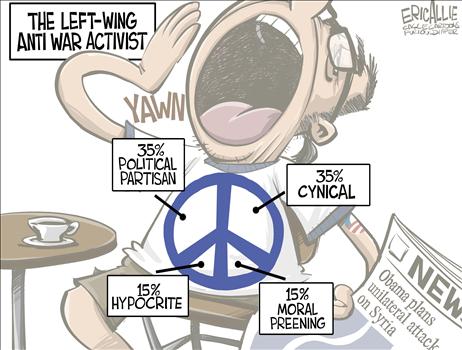A Senate hearing yesterday on the Syrian situation and the administration’s desire to get involved militarily constrains me to comment once again on this topic. My last post laid out some of my rationale for opposing involvement: neither side deserves our help; we will either be aiding a dictatorial regime allied with Iran or an uprising with a distinctly Al Qaeda flavoring. I have a few more thoughts to add today.
First, it’s interesting how this is not a purely partisan issue. Many conservatives who supported military moves in Afghanistan and Iraq are not now supportive of this initiative, whereas diehard liberal activists who would scream against any military endeavor anywhere are strangely silent (except for a few Code Pink fanatics who are at least consistent in their wild-eyed fanaticism). One cartoon captures the liberal side pretty well:
As for the conservative reluctance to sign on to military strikes, there is some poor analysis of that reluctance showing up in surprising places. For instance, I was watching Bill O’Reilly last night, and he focused more on the conservative side and tried to explain why they were generally not supportive of Obama’s desire to bomb Syrian targets. He concluded it was because conservatives either hate or don’t trust the president. While there certainly is hatred of what this president stands for overall and distrust of him personally and of his ability to carry out the mission, it is a leap too far to say that’s the cornerstone of opposition to his proposed policy.
I see a qualitative difference between our involvement in Afghanistan and Iraq and the current situation in Syria. Afghanistan was harboring the Al Qaeda terrorists who carried out 9/11. We were obligated to respond to an attack on our soil that killed nearly 3,000 people. Saddam Hussein’s Iraq had invaded Kuwait in the early 1990s and a coalition of many nations drove him out. The U.S. was left with the responsibility of overseeing Saddam’s regime to ensure he didn’t kill Iraqi opposition groups and to monitor his chemical and nuclear weapons capabilities. After 9/11, when it became clear he was allowing Al Qaeda elements to operate from Iraq, and when we learned he was encouraging suicide bombers by paying families of those who carried out those atrocities, President Bush felt he had to act.
Isn’t it a little ironic that those who decried Bush’s rationale—Saddam had chemical weapons—are now so exercised over Syrian use of those weapons? And isn’t it even more ironic that those who scoffed at the idea that Saddam quickly moved those weapons to Syria are now in the forefront of moral outrage over their usage there?
I’m also less than overwhelmed with the military plans being offered. If you are going to use the military, it needs to efficiently achieve a goal of turning the tide against the Syrian regime. Apparently, that’s not what’s being proposed. John Kerry, at the Senate hearing, downplayed regime change as the ultimate aim; all we’re planning to do is try to discourage the further use of chemical weapons by Assad. If Assad is really all that bad—and he is—the only good rationale for getting involved is to go all out and drive him from power. That doesn’t seem to be the vision here:
This would be a highly ineffectual mission. It’s not worth the effort. Besides, if we’re truly concerned with stabilizing the region, we need to go after the primary destabilizer—Iran. They’re the ones on the verge of creating nuclear weapons. They’re the ones who have verbally called for the elimination of Israel. Yet what have we done on that front? Just talk and threaten. Frankly, no one takes us seriously anymore. Why should they with this man in the White House? Let’s be honest. His sympathies lie with the radical elements; that’s how he was educated, and it’s how he has governed. He supported the Muslim Brotherhood takeover of Egypt, yet he is cool toward the ouster of that Brotherhood. He is for the uprising in Syria because of its radical nature, not in spite of it.
Here’s what a compassionate nation does in this situation: we use every effort to help the refugees who are daily escaping this conflict. We demonstrate once again that the United States, more than any other nation in history, comes to the aid of those who are suffering. The only problem is that we’re not the same United States anymore—not with Barack Obama at the helm.
So, to some extent, Bill O’Reilly is correct; I don’t trust the man calling the shots. But it’s not just the man himself: it’s his ideology, the policies that flow from it, and the damage he is doing to what once was the greatest nation in the world.


